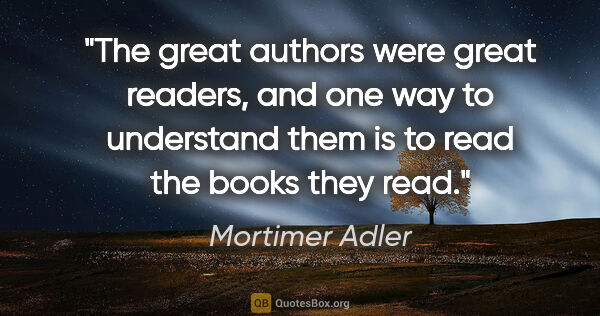Authority Quotes (page 45)
There, in a gloomy street not far from the monastic walls of the Sorbonne, he pursued his favorite speculations. Sometimes he spent hours in the great libraries of Paris, those catacombs of departed authors, rummaging among their hoards of dusty and obsolete works in quest of food for his unhealthy appetite. He was, in a manner, a literary ghoul, feeding in the charnel-house of decayed literature.
Washington Irving
One of the surest tests of the superiority or inferiority of a poet is the way in which a poet borrows. Immature poets imitate mature poets steal bad poets deface what they take and good poets make it into something better or at least something different. The good poet welds his theft into a whole of feeling which is unique utterly different than that from which it is torn the bad poet throws it into something which has no cohesion. A good poet will usually borrow from authors remote...
T. S. Eliot
People know, or dimly feel, that if thinking is not kept pure and keen, and if respect for the world of mind is no longer operative, ships and automobiles will soon cease to run right, the engineer's slide rule and the computations of banks and stock exchanges will forfeit validity and authority, and chaos will ensue.
Herman Hesse

Dissident Natan Sharansky writes that there are two kinds of states -- "fear societies" and "free societies," two kinds of consciousness. The consciousness derived of oppression is despairing, fatalistic, and fearful of inquiry. It is mistrustful of the self and forced to trust external authority. It is premised on a dearth of self-respect. It is cramped. In contrast, the consciousness of freedom is one of expansiveness, trust of the self, and hope. It is a consciousness of limitless...
Naomi Wolf
To admit authorities, however heavily furred and gowned, into our libraries and let them tell us how to read, what to read, what value to place upon what we read, is to destroy the spirit of freedom which is the breath of those sanctuaries. Everywhere else we may be bound by laws and conventions—there we have none.
Virginia Woolf
Frederick Douglass (born Frederick Augustus Washington Bailey, (born circa 1818? February 20, 1895) was an American abolitionist, women's suffragist, editor, orator, author, statesman and reformer. Called "The Sage of Anacostia" and "The Lion of Anacostia", Douglass is one of the most prominent figures in African-American and United States history. He was a firm believer in the equality of all people, whether black, female, Native American, or recent immigrant. He was fond of saying, "I would...
Frederick Douglass
But newspapers have a duty to truth,' Van said. Lev clucked his tongue. 'They tell the truth only as the exception. Zola wrote that the mendacity of the press could be divided into two groups: the yellow press lies every day without hesitating. But others, like the Times, speak the truth on all inconsequential occasions, so they can deceive the public with the requisite authority when it becomes necessary.'Van got up from his chair to gather the cast-off newspapers. Lev took off his glasses...
Barbara Kingsolver
Moving forward quietly to Jerott’s side, Adam Blacklock had heard. ‘Don’t you understand? The authorities are afraid of them both,’ he said gently. ‘Why do you supose this cordon is here, which only an unarmed girl was allowed to pass through? Lymond, loyal to Scotland, might be a threat to French power greater than even Gabriel, one of these days—Philippa!’ And a wordless shout, like a cry at a cockfight, rose among the stone pillars and sank muffled into the old, dusty banners above the...
Dorothy Dunnett
If the account given in Genesis is really true, ought we not, after all, to thank this serpent? He was the first schoolmaster, the first advocate of learning, the first enemy of ignorance, the first to whisper in human ears the sacred word liberty, the creator of ambition, the author of modesty, of inquiry, of doubt, of investigation, of progress and of civilization.
Robert Green Ingersoll

